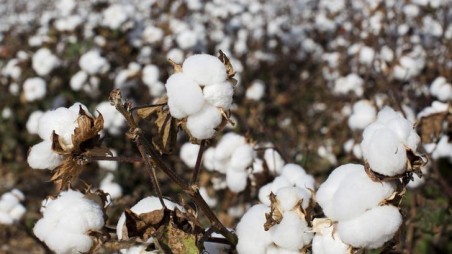Bangladesh set to recognise cotton as agricultural product
In FY24, 2.05 lakh bales of cotton were produced domestically against 85 lakh bales annual demand

Highlights
- It aims to boost local cotton farming
- It will help reduce reliance on cotton imports
- Policy support will ease to get low interest loans
- Country's annual cotton demand 85 lakh bales
- Govt set target of 200,000 hectares cultivation
- Aims to meet 20% of the country's cotton demand
- Textile industry to benefit significantly
The government is going to recognise domestically produced cotton as an agricultural product to meet huge demand for cotton in the country' textile industry.
The agriculture ministry is scheduled to place the proposal for approval at the advisory council meeting on Tuesday (6 May), according to Cabinet Division sources.
Experts say this long-awaited recognition will open the door to critical financial support for cotton farmers and potentially transform the sector by encouraging wider cultivation across underutilised lands.
Md Fakhre Alam ibn Tabib, executive director of the Cotton Development Board (CDB), told The Business Standard that Bangladesh currently relies heavily on cotton imports to meet domestic demand, placing strain on foreign exchange reserves and exposing the textile industry to geopolitical risks.
"There is a huge demand for cotton in the country, most of which is met by imports. This not only costs valuable foreign currency but also makes our large, labour-intensive textile sector vulnerable," he said.
To address this, the government has set a target to increase cotton cultivation to 200,000 hectares by 2050—up from just over 45,000 hectares in FY 2023–24. This expansion is expected to meet up to 20% of the country's total cotton demand. Around 205,421 bales of cotton were produced domestically in FY24.
The annual demand of cotton stands at around 85 lakh bales, according to the Bangladesh Textile Mills Association (BTMA).
The government aims to bring unused or underutilised lands—such as char (riverine islands), barind (drought-prone), hilly areas, and even certain fruit orchards—under cotton cultivation, without compromising food production, Fakhre Alam said.
Recognising cotton as an agricultural product will allow farmers to access subsidised loans at just 4% interest, similar to other import-substituting crops. "To increase cotton cultivation, farmers need incentives," said the Cotton Development Board executive director.
"This policy support will allow them to access low-interest loans and encourage broader participation, including contract farming," he added.
The move has been widely welcomed by stakeholders. Experts say the policy will have a multifaceted positive impact on the rural economy, agriculture, and the textile industry—one of Bangladesh's economic pillars.
Speaking at a seminar in Dhaka on 17 March, Foreign Affairs Adviser Md Touhid Hossain said cotton would be tagged as an agricultural product within two months.
He also stressed that replacing tobacco with cotton on some lands would not only restore soil health but also bring long-term economic benefits to farmers. "The interim government will not hesitate to take a decision that is good for the country, even if it goes against vested interests," the adviser said.



 Keep updated, follow The Business Standard's Google news channel
Keep updated, follow The Business Standard's Google news channel















